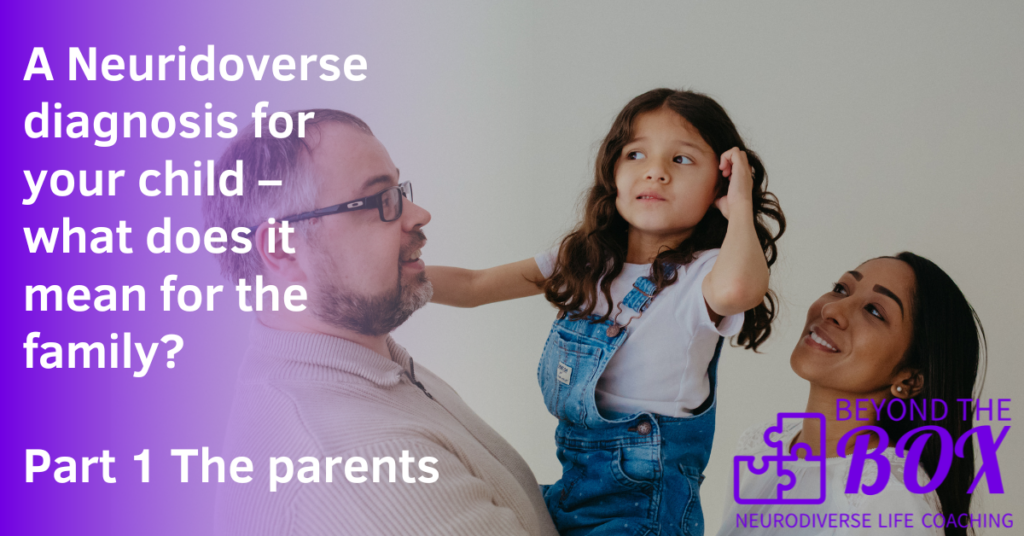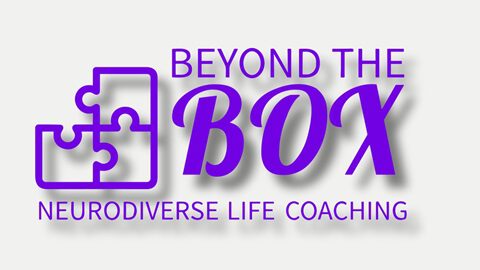Before I go any further, I will say this 5-min read has been a hard one for me to write because it brings up all the emotions we had when our child received the diagnosis which we pushed for. It still shakes your world in a way you never knew. You will pick yourself up you will learn and adapt. Give yourself time, space and be gentle with yourself. You will not get everyting right the first time or even the second!
There are three persectives to be understood here first;
- The parents supporting the child
- The child receiving the diagnoisis
- The siblings of the family
- Family life & the wider family
Each of these groups will experience the diagnosis differently!
The Parent/s
As a parent when your child is born you always want the best for your child to grow up have a good childhood, be a good human, do well at school, get a job that will leave them financially secure and, in genral, have a good life. When you receive the diagnosis for your child you know that the life you had hoped for is different from your original vision. Receiving a diagnosis for a child is a mix bag of emotions. It is fear, what does the future hold for your child? It is also a relief. Now there is a clear reason why your child behaves in that particular way. There will be tears, fear of the unknown, asking “why us!”, what does this mean?
From this point you will go on a huge and very fast learning curve. What actions you take to adjust and adapt will be dependent on the severity of your childs diagnosis.
For me and my husband, we got support to help us better understand how to parent a child with Autisum. We first needed to learn what it means to be Autisic and be on the spectrum. As you may already know by now that spectrum is a huge long line. You may pick a point for your child and think that is where they are on the spectrum. That point you picked on the line will be continually challenged. It can depend on how full their battery is that day. Then do this pesky thing called growing up and hitting puberty and the roller coaster begins.
You then need to learn a new communication process with your child. What we did not realise is the picking up of facial social cues was difficult for our child. She thought everyone was happy all day everyday and she was the only one feeling sad. In one session with a coach this came up and she said that everyone is always happy. The coach asked me how I was feeling at that moment. My response:
Well I am ok, I have a bad cold so I am feeling a bit ill. She looked at me and said; should you not be at home in bed? My response was probably but you and me need to be here so here we are! That is when I realised just how much she did not pick up on naturally. So we then had a happy/sad washing line in our kitchen.
You will continually learn how to support your child, take an approach to behaviour managment and boundary setting and how to communicate. For children on the spectrum you will also learn when the autisum is controling behaviour and when its a child pushing the boundaries as they do because the normal child behaviour does not stop just because they are neurodiverse. That can be fun! at times. Give yourself the time; be willing to learn and adapt then your child will feel loved and supported. They may express that differently but its their way of communication you will learn to understand. Then you start to teach your childs extended world to understand their communication.
Do not underestimate your child. They know they are not quite the same as other children even if they cannot verbalise it. Dependant of the age of your child and their emotional and mental capacity will determine how and when you communicate what the disagnosis is and what it means for them. Our child recvied the diagnosis age 8. At that point with the help of a coach we explained Autisum to her. Through working with the coach we also began to understand her better and how to communicate with her better. When you really start to listen to your child they will start to tell you about their world, how they process and understand the world around them.
For us, we definitely changed how we communicated with her. Her communication is very litteral. We had to learn that but sometimes we still slip up. The children have jobs for pocket money so we negoiated a fee for emptying the dishwasher each day. Which she did when I asked why she was not refilling the dishwasher her response was: you did not say that refilling the dishwasher was included! No I did not. I forgot to be very literal. The next sentence was; If you don’t say it, I don’t do it! So, yes the little darling was correct in her world, but there was also a child pushing the boundaries and taking advangtage of a busy Mum. OK, my dear you won that one! A bit of advice. Pick you battles. Work on the communication continually, understand their world. Mostly remember its their world. They will let you in when they are comfortable. Teach them how to live life on their terms in a neurotypical world and teach them how the neurotypical world works. You can guarantee things you thought children pick up normally they never will unless its explained litterally. Other times, they will absolutely stun. You they will pick something up and explain it to you constantly smashing any preconception you had hung onto!
As our daughter has grown, we have given her more information about her diagnosis about what it means. She has received support form threapy and coaches at different stages in her journey. Now she teaches/tells us how she feels and sees life because she feels we will listen to her. What does the future hold for her. We don’t know; but we do know it will be a future that works for her and she will have a good life.


Wonderful blog entry expressing both heart and your knowledge!